

Social Isolation. The elderly are vulnerable to facing social isolation. Isolated elderlies. The dangers of social isolation in the elderly. Effects of loneliness of the elderly. Infographic on socially isolated elderly in the US. Social isolation risk checklist. Social isolation in elderly. Effects of Social Isolation on Health. Social isolation and loneliness among older adults in the context of COVID-19: a global challenge.
Social isolation is defined as the objective state of having few social relationships or infrequent social contact with others while loneliness is a subjective feeling of being isolated.
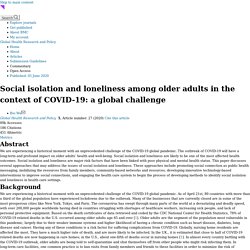
Social isolation and loneliness are serious yet underestimated public health risks that affect a significant portion of the older adult population. In the U.S., approximately one-quarter of community-dwelling older adults are considered to be socially isolated, and 43% of them report feeling lonely [2]. The COVID-19 pandemic is increasing the number of older adults who are socially isolated including both community-dwelling older adults and nursing home residents, as many countries have issued stay-at-home orders and banned visits for nursing home residents.
Prior to the disease outbreak, the vast major of community-dwelling older adults actively participated in social activities, such as attending senior centers, churches activities, traveling, and many other social events. Health Effects of Social Isolation and Loneliness – Aging Life Care Association™ Clifford Singer, MD Adjunct Professor, University of Maine Chief, Geriatric Mental Health and Neuropsychiatry Acadia Hospital and Eastern Maine Medical Center 268 Stillwater Avenue Bangor Maine 04402 207.973.6179 csinger@emhs.org Cliff Singer is a geriatrician and psychiatrist.
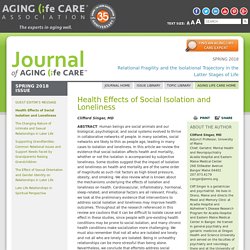
Social isolation, loneliness in older people pose health risks. Human beings are social creatures.
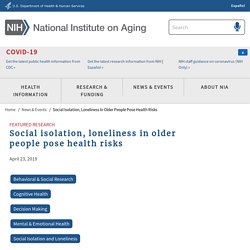
Our connection to others enables us to survive and thrive. Yet, as we age, many of us are alone more often than when we were younger, leaving us vulnerable to social isolation and loneliness—and related health problems such as cognitive decline, depression, and heart disease. Fortunately, there are ways to counteract these negative effects. NIA-supported researchers are studying the differences between social isolation and loneliness, their mechanisms and risk factors, and how to help people affected by these conditions.
Effects of social isolation on the elderly. How Social Isolation Affects the Brain. Daisy Fancourt was at her home in Surrey in southeast England when the UK government formally announced a nationwide lockdown.
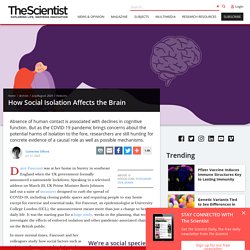
Speaking in a televised address on March 23, UK Prime Minister Boris Johnson laid out a suite of measures designed to curb the spread of COVID-19, including closing public spaces and requiring people to stay home except for exercise and essential tasks. For Fancourt, an epidemiologist at University College London (UCL), the announcement meant more than just a change to her daily life. It was the starting gun for a huge study, weeks in the planning, that would investigate the effects of enforced isolation and other pandemic-associated changes on the British public. We’re a social species. We really need others to survive. Untitled. Social isolation and its effects on development in the elderly.
Psychosocial Development in Late Adulthood. What you’ll learn to do: describe psychosocial development in in late adulthood Our ideas about aging, and what it means to be over 50, over 60, or even over 90, seem to be stuck somewhere back in the middle of the 20th century.
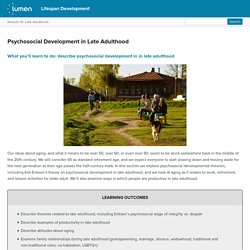
We still consider 65 as standard retirement age, and we expect everyone to start slowing down and moving aside for the next generation as their age passes the half-century mark. In this section we explore psychosocial developmental theories, including Erik Erikson’s theory on psychosocial development in late adulthood, and we look at aging as it relates to work, retirement, and leisure activities for older adult. We’ll also examine ways in which people are productive in late adulthood. Learning outcomes Psychosocial Development in Late Adulthood Erikson: Integrity vs. As a person grows older and enters into the retirement years, the pace of life and productivity tend to slow down, granting a person time for reflection upon their life. Figure 1. Boundless Psychology. Physical Development in Late Adulthood The aging process often results in a loss of memory, deteriorated intellectual function, decreased mobility, and higher rates of disease.
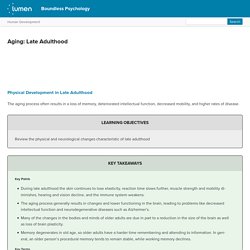
Learning Objectives. Loneliness of social isolation and dementia in the elderly. Physical pain is unpleasant, yet it’s vital for survival because it’s a warning that your body is in danger.
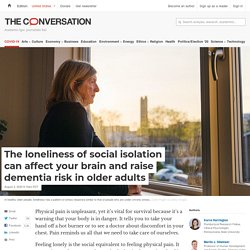
It tells you to take your hand off a hot burner or to see a doctor about discomfort in your chest. Pain reminds us all that we need to take care of ourselves. Feeling lonely is the social equivalent to feeling physical pain. It even triggers the same pathways in the brain that are involved in processing emotional responses to physical pain. Just like feeling physical pain, feeling lonely and disconnected from others is also a signal that we need to take care of ourselves by seeking the safety and comfort of companionship. As scholars at the Center for Healthy Aging at Penn State, we study the impact of stress on the aging body and brain, including how it can worsen cognitive decline and risk for dementia. The health consequences of loneliness The COVID-19 pandemic has put many older adults’ social lives on hold, leaving them at greater risk for loneliness.
Steps to take to prevent social isolation in the elderly. Preventing social isolation in the elderly. How to reduce social isolation in the elderly. Caregivers To-dos. Ways to cope with neurodegenerative diseases. Caregiver support for the elderly.